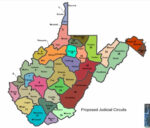If you once had good well water, but it is now smelly and discolored and you feel it is making you sick, you probably will investigate matters. If you suspect a nearby company is the source of the contamination, you’ll probably try to remedy the situation. If the company and its supposed regulators don’t help you and appear to be in cahoots, you may see the courts as the place to seek justice.
But, if you live in West Virginia, and you believe the source of your troubles is a coal company, you may well wonder if justice can be served in courts where judges receive campaign contributions from the likes of coal barons and coal corporations.
Such is the case for people living along Cedar Creek Road who, in 2007, began to notice changes in their well water, the only source of water for the small Wyoming County community. Ten years earlier a mountaintop removal operation owned by coal operator Jim Justice had started up nearby, on Coal Mountain.
At first, there was a bad odor that would come and go. The water got worse over time, becoming discolored, stinking of sulfur, and causing corrosion around toilet and sink fixtures.
In 2009, Justice sold the mine, Dynamic Energy Inc., and its parent company Mechel Bluestone Inc., to the Russian firm Mechel. In 2012, the Russian firm idled the mine, citing lack of demand for coal.
By then, neighbors felt like there was an inordinate amount of cancer and other illnesses in their neighborhood. They suspected their deteriorated and now contaminated water was causing the health issues, and they suspected the mountaintop removal operation and possible unpermitted coal slurry disposal had contaminated the water.
When regulators didn’t help, one resident contacted OVEC, the Huntington-based Ohio Valley Environmental Coalition, to see if we could help get their well water independently tested. We raised funds for the testing, which took place over a couple of years. To get an accurate analysis of the water, scientists needed multiple samples, taken over time, to account for weather and other seasonal conditions.
The water testing ultimately revealed dangerous levels of lead, arsenic, strontium, iron, and manganese. In 2014, residents went to court to seek relief and justice. The lawsuit played out in the courts over several years, but from the get-go, plaintiffs worried about their ability to prevail over a coal company in such a coal-dependent place.
As the lawsuit proceeded, in 2015, Justice bought the mine back from the Russian company and soon reopened it. In 2016, Justice became governor of West Virginia.
The lawsuit ended up before the West Virginia Supreme Court, after a Wyoming County jury’s decision that the Justice operation did not contaminate the water wells of families living along Cedar Creek. The families believe they had a strong case that showed otherwise, and they felt that the six-person jury and a person who would have been a key witness were improperly influenced by coal workers attending the trial. The state Supreme Court didn’t see it that way, and ruled in favor of the lower court’s ruling. Gov. Justice prevailed, but for the Cedar Creek families justice was not served.
Taxpaying citizens, like the families of Cedar Creek, have high hopes that the West Virginia Supreme Court and other courts are fair and impartial. But when we know that there is big money being poured into West Virginia campaigns, and then we see a decision where families are denied the right to clean water, we wonder to what degree the money is influencing our judges’ decisions.
According to West Virginia Secretary of State data collected by followthemoney.org and WV Citizens for Clean Elections, since 2000, candidates running for the state Supreme Court have received $529,654 in campaign contributions from the energy and natural resources sector, and another $2,266,895 from so-far unidentifiable sources. All of the sources of financial backing may be influencing the decision of many different types of cases including environmental justice, distributive justice, criminal justice, and social justice.
In 2017, a report from the Brennan Center for Justice and the National Institute on Money in State Politics found that a torrent of special interest money, often from secretive sources, is pouring into Supreme Court races around the nation. The report noted that in 2016 five judges ran for one seat on the West Virginia Supreme Court, attracting more than $3 million in funds for campaign advertising from outside sources.
While the Supreme Court justices may say or even truly feel that these campaign contributions won’t influence their decisions, special interest money in judicial races is kind of like the water of the families on Cedar Creek: it looks bad, it smells bad, and it’s bad for our health — in this case, the health of our system of government.
This column by Natalie Thompson was published in the Charleston Gazette-Mail on May 14, 2018. Thompson is executive director of the Ohio Valley Environmental Coalition and co-coordinator of WV Citizens for Clean Elections.











